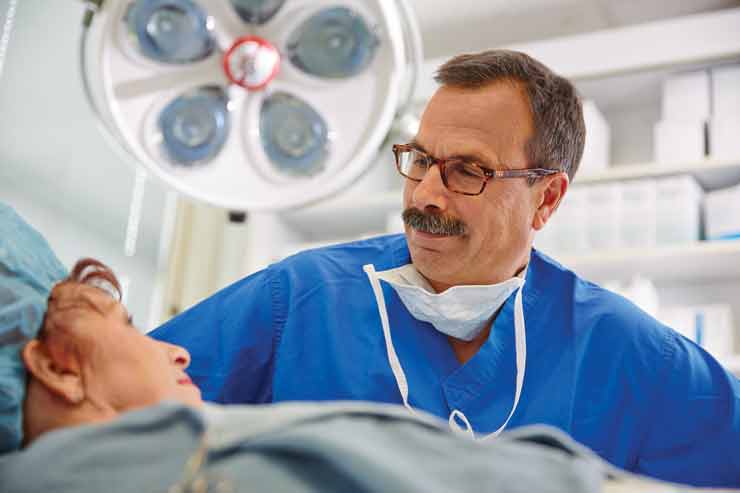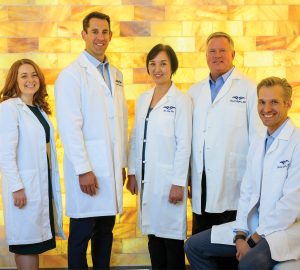Summer will soon be here, bringing lazy days at the pool and golf course—and too much sun. Skin cancer, the most common cancer in the United States, affects more people than all other cancers combined—and studies show it’s increasing in patients under 40.
Surgeons at SLUCare, the physicians of Saint Louis University, are among the most skilled skin cancer experts in the nation. “We have an incredible depth of expertise in every area, including Mohs surgery, an outpatient procedure,” says Dr. Scott Fosko, professor and chairman at SLU School of Medicine’s department of dermatology and director of SLUCare’s division of Mohs surgery and cutaneous oncology.
Fosko, president of the prestigious American College of Mohs Surgery (ACMS), works with Dr. Ian Maher, assistant professor of dermatology. Fellowship-trained members of ACMS, both have completed a year or more of advanced training at an approved Mohs center and have performed thousands of surgeries. And both are concerned about the rise in skin cancer they’re seeing at their Des Peres and midtown practices, particularly among women in their 30s through 60s. “We’re trying to raise awareness about the dangers of indoor tanning as well as sun exposure,” Maher says. “Unless there’s a change, dermatologists won’t be able to keep up with the number of cancers.”
If you’re one of more than 2 million Americans each year who get skin cancer, Mohs surgery might be an option. It’s particularly effective in cosmetically sensitive areas where there isn’t much tissue to spare, such as the eyelid, nose, lips or ear; when the cancer’s borders are indistinct; or when a tumor reoccurs after being removed by another method. “Mohs accurately removes common types of skin cancer such as basal and squamous cell carcinomas, which have increased 77 percent in less than 15 years,” Fosko explains. “It can also be effective on more advanced cancers.”
After numbing the area with a local anesthetic, the surgeon excises the visible tumor and a layer of surrounding tissue, which is immediately processed in the laboratory while the patient waits. “All of the tissue around the excised tumor is examined, not just a sample of the margin,” Fosko says. “If evidence of cancer is found in the outer or deeper edges of the tissue, the surgeon takes another layer from the area where the cancer was detected. This is repeated until the borders of the tissue are completely clear of cancer, ensuring the cancer has been removed and preserving healthy tissue.” If reconstruction is needed, it often can be done the same day.
SLUCare has a wide array of tools for treating early to advanced skin cancer, and is in the forefront of skin cancer research, Fosko says. “We’re renowned throughout the region for our multidisciplinary approach to managing all aspects of patient care. We strive to find the best treatment modality for each individual. It takes teamwork to save lives and restore health, and that’s exactly what we deliver.”
By Tony Di Martino
Photo By SLUCare
Pictured: Dr. Scott Fosko
SLUCare provides expertise in Mohs surgery, an outpatient procedure that accurately removes cancerous tumors while sparing healthy tissue. Physicians practice at two locations: the Anheuser-Busch Institute, 1755 S. Grand Blvd., and SLU are Des Peres, 2315 Dougherty Ferry Road. For more information, call 314.977.4440 or visit slu.edu.








